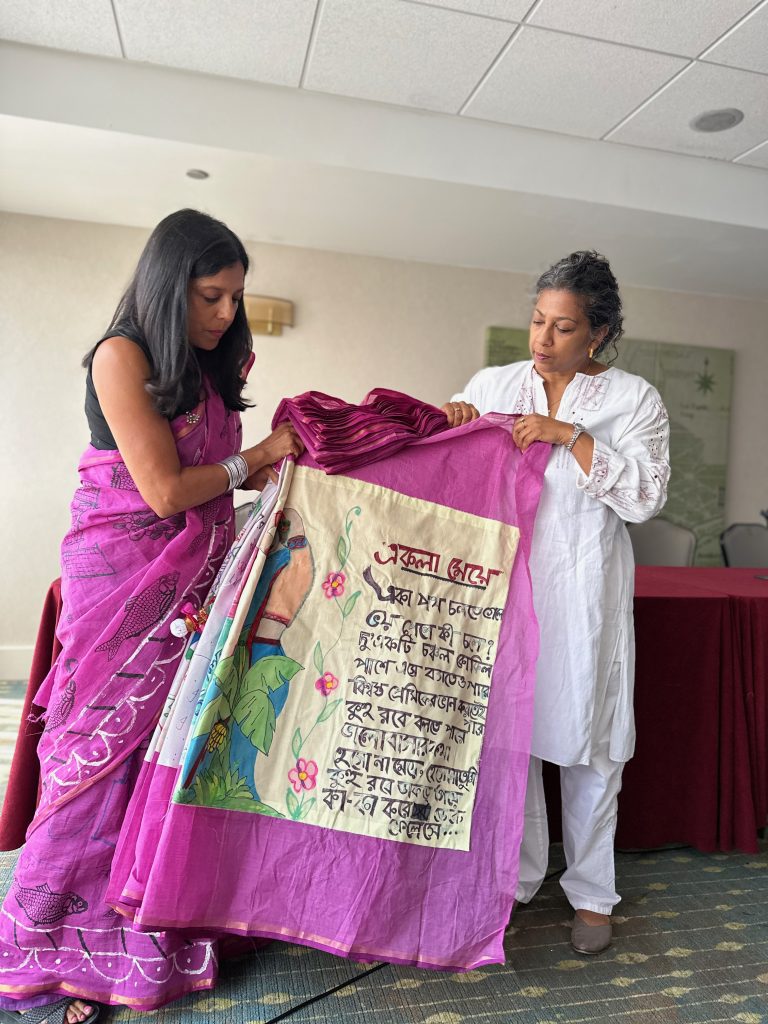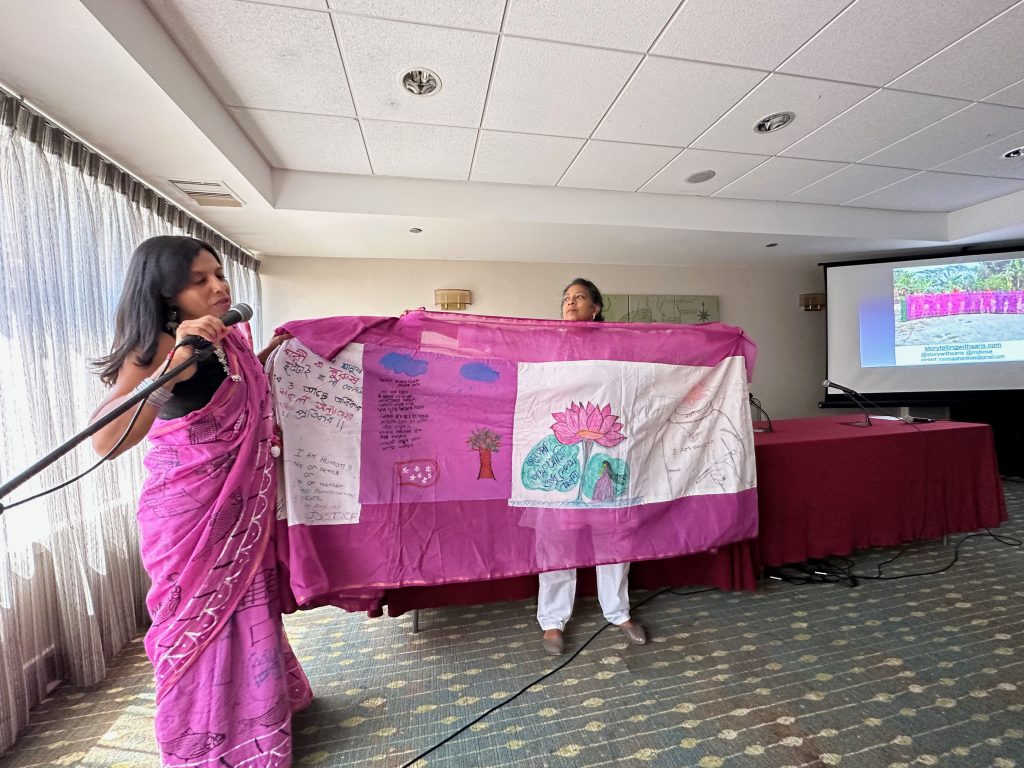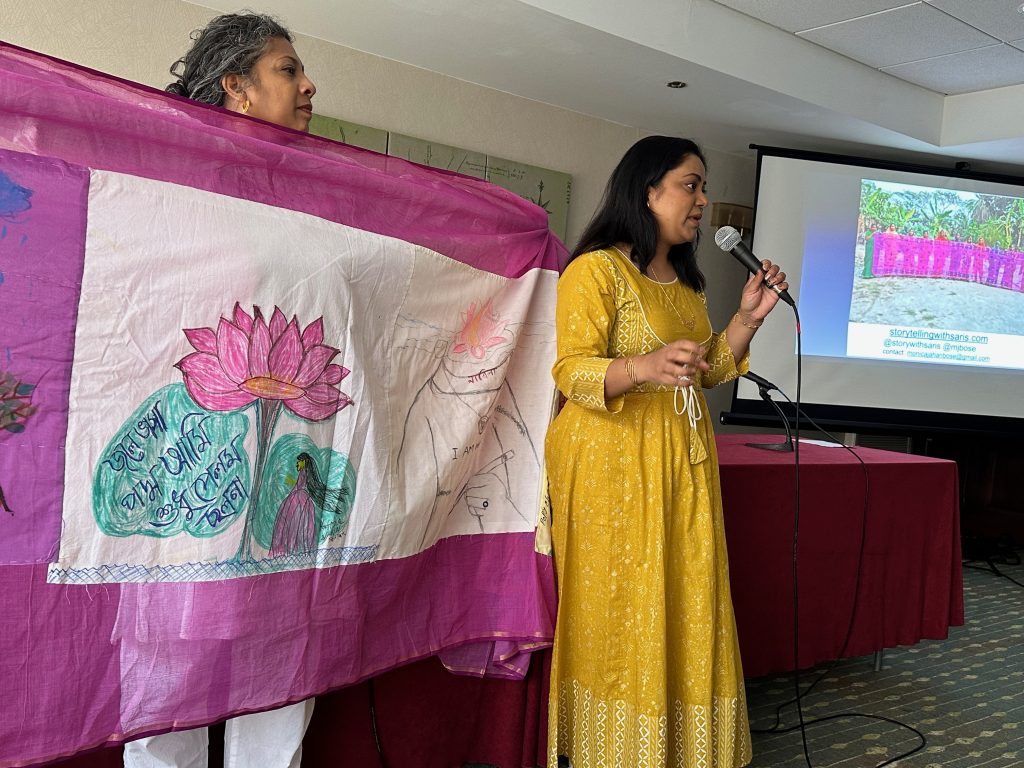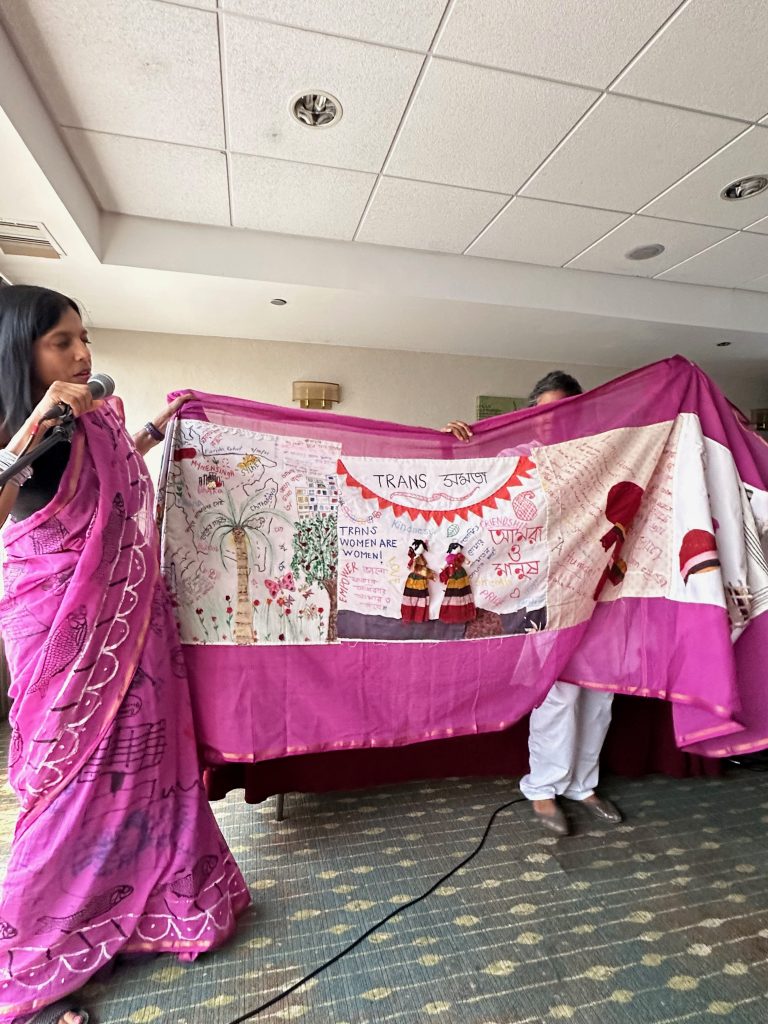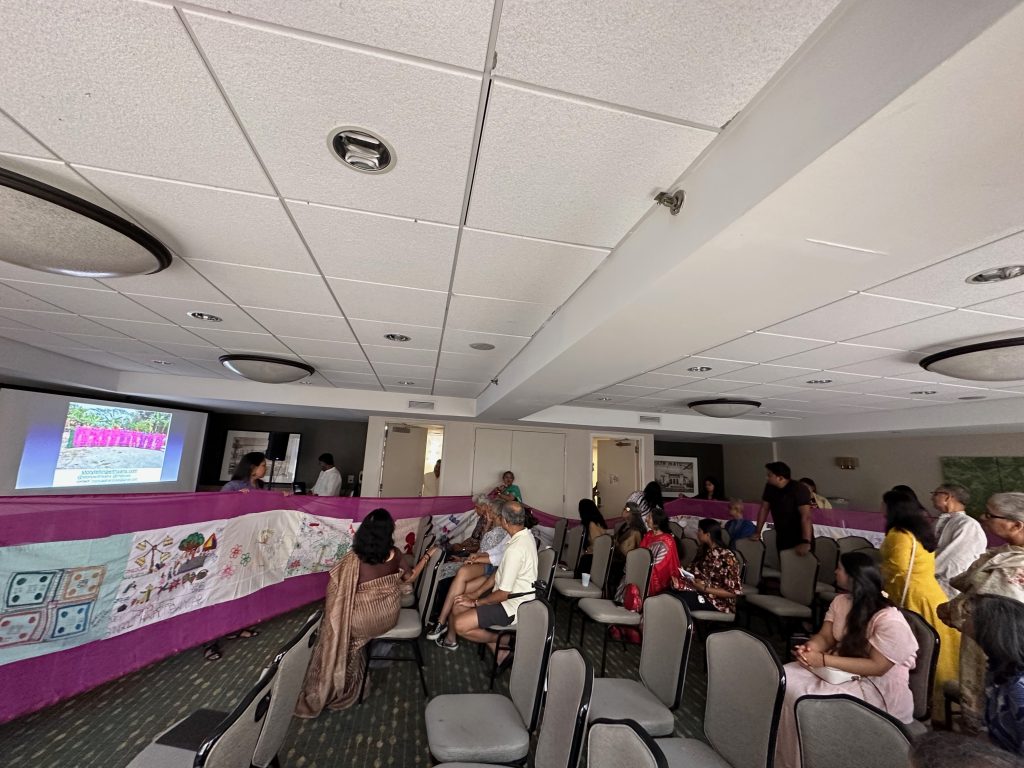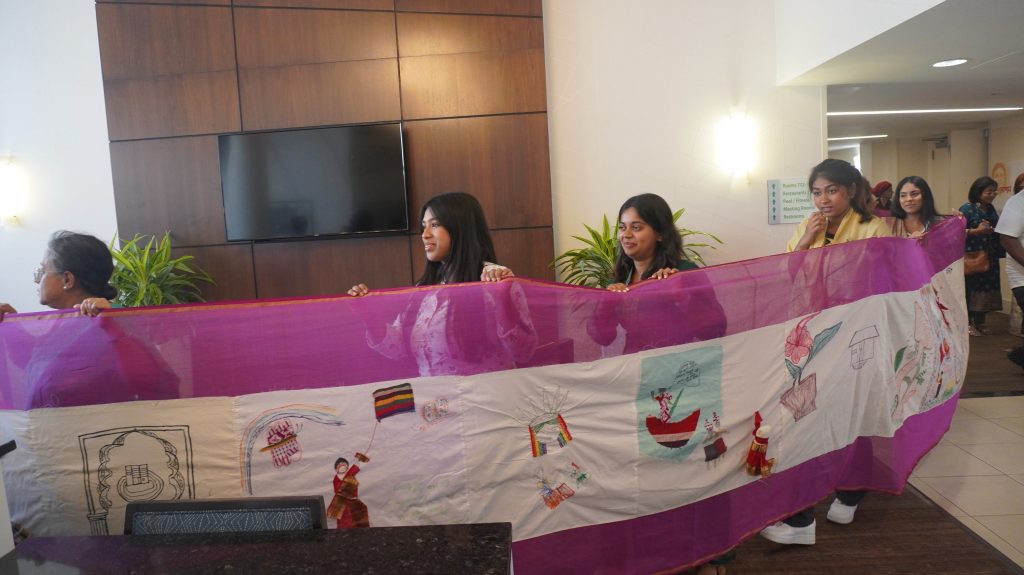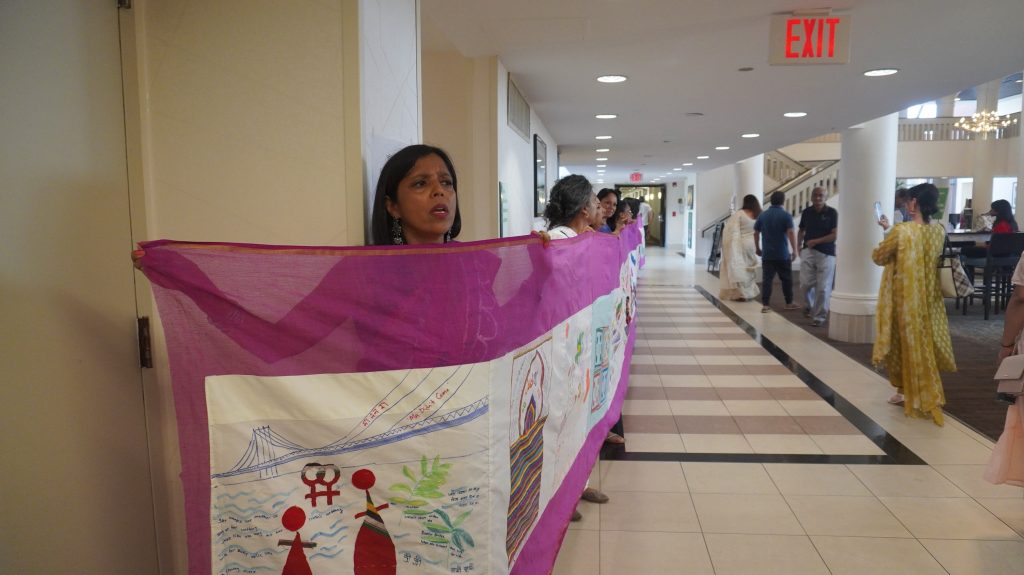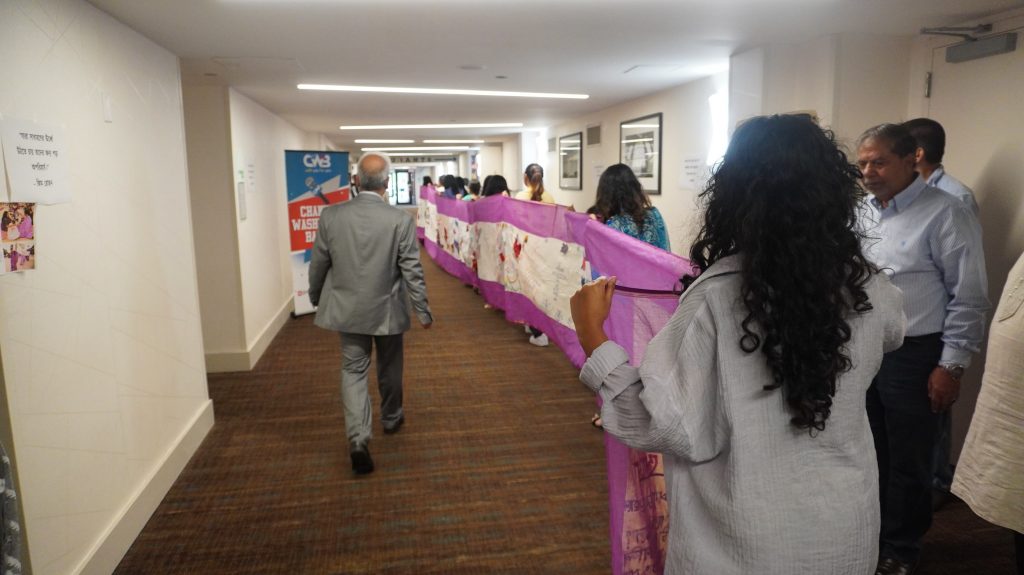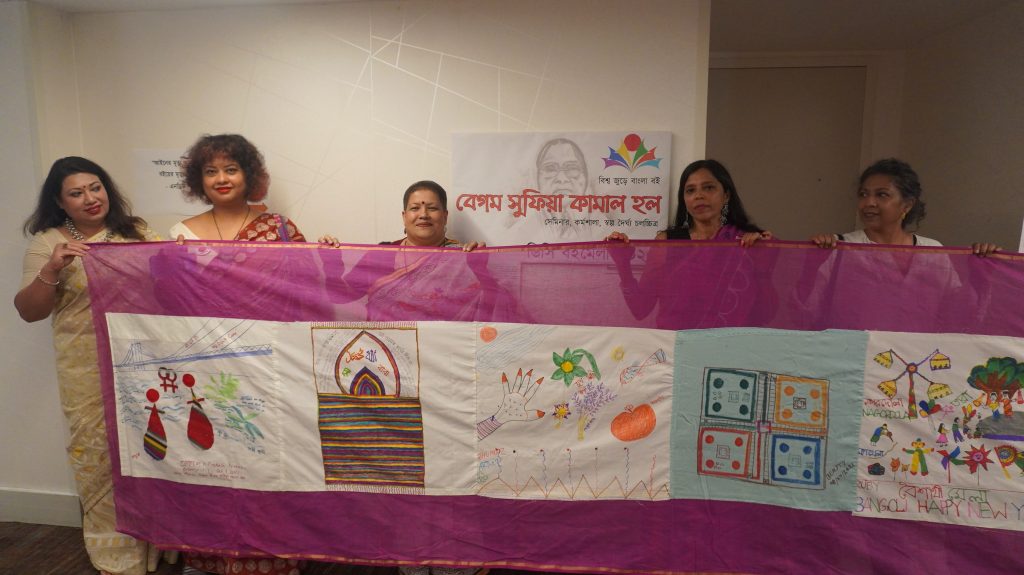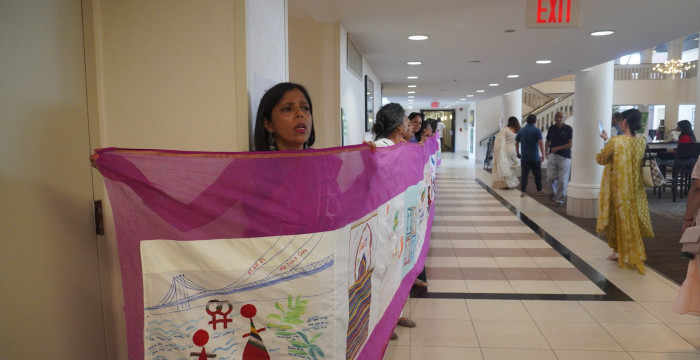
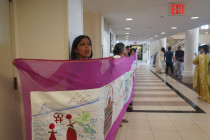
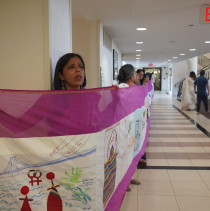
Prokash Scroll @Boimela
“প্রকাশ “ পটচিত্র পারফরমেন্স
মনিকা জাহান বোস
মনিকা জাহান বোস একজন বাংলাদেশী-আমেরিকান শিল্পী, আইনজীবী ও মানবাধিকারকর্মী। তার কাজের মধ্যে চিত্রাঙ্কন, ভাস্কর্য, ফিল্ম ও ছাপচিত্র। ওয়েসলিয়ান বিশ্ববিদ্যালয় এবং ভারতের শান্তিনিকেতনে তিনি শিল্পকলা বিষয়ে অধ্যয়ন করেন এবং কলাম্বিয়া বিশ্ববিদ্যালয় থেকে আইন বিষয়ে ডিগ্রী লাভ করেন। তার শিল্প প্রদর্শনী বিশ্বের বিভিন্ন দেশের গ্যালারি ও মিউজিয়ামে অনুষ্ঠিত হয়েছে- বাংলাদেশ, ফ্রান্স, জাপান, ভারত, গ্রিস, ইতালি, যুক্তরাষ্ট্র। মনিকা ২০১২ তে ‘নারীর কথা: শাড়ীর মধ্যে জীবনগাথা’ প্রকল্পটি আরম্ভ করেন। এখানে শিল্পের মাধ্যম হিসেবে ব্যবহার হয় শাড়ী- একটি চিত্রপট, একটি গল্পের খাতা। মনিকা ২০২১ সালে ব্রুকলিনের বাংলাদেশীদের সাথে “প্রকাশ” প্রকল্পে কাজ করেন জেন্ডার / লিঙ্গ , মানসিক স্বাস্থ্য, এবং অভিবাসন বিষয় নিয়ে। সার্বিক সহযোগিতায় – আর্টস অ্যান্ড ডেমক্রেসী এবং তহবিল অনুদানে এশিয়ান ওমান’স গিভিং সার্কেল।
The Prokash scroll and performance at the DC Boimela Bangla Book Fair made quite a splash at the Holiday Inn Washington Dulles in Sterling, Virginia. The 57-foot scroll of art and bi-lingual poetry illuminates gender, identity, and immigration and was created through eight workshops that I led in 2021 with Arts & Democracy, the Bangladesh Institute of Performing Arts (BIPA), and Bangladeshi Ladies Club and other multi-generational participants from New York City. On the first day of the Boimela, I sat at a table with the folded scroll to talk to people about the upcoming performance. People kept unrolling the scroll and looking at it. The scroll was stitched onto three saris (joined together) with the help with women from my ancestral village – Katakhali on Barobaisdia Island in Bangldesh. During the book fair, women kept asking me if they could wear the scroll sari — some even offered to buy it. I explained that it’s an art piece, a sort of book and scroll, and they would have to wait to see it on Sunday at noon on August 27, 2023 in the seminar room called “Sufia Kamal Hall” (named after the renowned feminist activist who founded Mahila Parishad, the largest women’s organization in Bangladesh). Many members of BIPA had arrived from New York to present their dance drama at the book fair. Several people ran over to me, excited to see the finished scroll that they had worked on. Each participant had created a square fabric piece of approximately 20 x 20 inches, with painting, writing, embroidery, kantha stitching, applique and/or doll-making techniques. We had sewn them together into a scroll outdoors as part of a performance in October 2021 in Brooklyn at the Avenue C Plaza. Hafiza was delighted to find her painting of a water lotus and her Bangla writing sewn into the three pink/purple saris. I invited her to speak about her piece during the performance. I didn’t know that BIPA would be coming to the Boimela until just a week before the event.
The performance began at noon on Sunday, which was very early considering the BIPA performance the night before ended after midnight. But I was delighted to see people trickling into the seminar room. By the time we started at noon, the room was filling up and several of the BIPA dancers, their leader Annie Ferdous, and others were in the room. My friend Sangeeta Mookherji assisted with the performance by holding and folding the massive sari as I unrolled it and sang and described various sections of the scroll. I first gave a brief introduction to the project and showed slides from the NY workshops and street performance. Photos and video were taken by Krittika Ghosh and my daughter Koli Bennett-Bose.
The performance was inspired by the patuas, “potchitro” scroll artists of West Bengal, Bangladesh and Orissa, who go from village to village opening their painted scrolls and singing songs about mythology or current issues such as the coronavirus. The words I sang roughly translated as”Listen listen, the world is changing. Gender equality. The right to love who you choose.” I added other lyrics as I went along. The tune was from a Katakhali Village oral tradition song in Patuakhali District, Bangladesh. As we unfolded the scroll, I would stop and describe some of the art/poetry made by participants, each on a separate square of cloth. When I got to the Annie Ferdous piece, I asked her to come up and talk about it. She described her applique piece, where she shows a woman rowing a Bangladeshi nouka boat, and men carrying kolshi full of water on their heads. After the whole scroll was opened up, I continued singing and the women in the room joined me in a procession up and down the halls of the Boimela. Thank you to everyone who has been part of Prokash. It was wonderful to have three generations – my mother, sister, and daughter -there for the Boimela performance!
-Monica Jahan Bose, August 30, 2023

